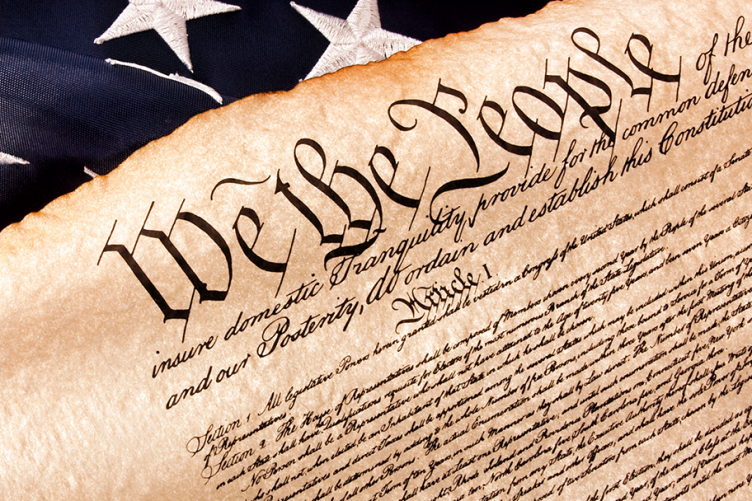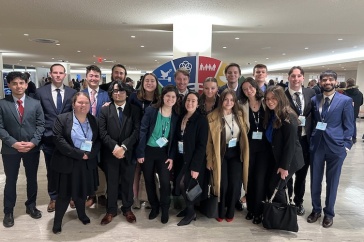
This week, as colleges and universities prepare for Constitution Day, the annual commemoration of the signing of the U.S. Constitution on Sept. 17, 1787, UNH associate professor of political science Susan Siggelakis reflects on a 1957 Supreme Court decision with a connection to the university.

One of the most important United States Supreme Court cases regarding free speech and due process came in the form of an appeal from the Supreme Court of New Hampshire in 1957. The majority opinion in Sweezy v. New Hampshire, 354 U.S. 234 (1957), was important, with some evidences showing that it constituted the “death knell” for legislative investigations into alleged subversion on college campuses during the Red Scare of the 1950s. However, it is perhaps the words of Associate Justice Felix Frankfurter that members of the UNH community should take to heart, particularly at a time when our campus, like so many other in the United States, finds itself roiled over the right to speak freely. Is speech with which we disagree violence? Is there such a concept as hate speech in the law? Is it ever permissible to deny others the right to speak?
The case involved an economist, Paul M. Sweezy, who was invited to speak to professor Gwynn Daggett’s humanities class at UNH. Both Daggett and Sweezy were being investigated by New Hampshire Attorney General Louis Wyman for alleged subversive activities related to Sweezy’s admitted membership in the Progressive Party. The Progressive Party, a rare third party in United States politics, ran a slate of candidates for national office in the 1948 general election. Henry A. Wallace, a former vice president of the United States, was its presidential candidate, and Glen Taylor, a former United States senator, joined him on the ticket as the vice-presidential candidate. Wallace’s main policy goal was to advocate for peace between the Soviet Union and the United States, although the party had other goals in its platform, including desegregation, nationalization of energy companies and women’s rights. Historians differ on the extent to which Wallace himself was a Communist and also on how much influence Communists had in the fledgling party organization.
Sweezy, the son of a vice-president of one of the largest banks in New York, was born in 1910 into a life of privilege. Like his two brothers, he attended Phillips Exeter and later went on to Harvard, where he edited The Harvard Crimson. His undergraduate major was economics, and he later pursued doctoral work there as well as at the London School of Economics (LSE). It was at the LSE that he came under the sway of some of the left-leaning economists at Cambridge, including Joan Robinson. During the New Deal, he worked for several governmental agencies and became particularly intrigued by the role of economic interest groups in shaping governmental policies on monopoly and competition. He was extremely active in providing outlets for the discussion of economic theory, particularly in light of the work of John Maynard Keynes, cofounding at Harvard The Review of Economic Studies and, later, in 1949, the Monthly Review, a publication that became the leading Marxist journal of the 20th century. Sweezy continued to write for and edit this publication well into the 1990s.
One of the most interesting episodes in Sweezy’s storied life involved his guest lectures at the University of New Hampshire. He had been denied tenure at Harvard, due allegedly to his iconoclastic ideas. New Hampshire's legislature, like many state legislatures during the 1950s, passed a law that was aimed at combating the threat of Communist subversion of the state government. This act resembled in many respects the national act passed by Congress, the Subversive Activities Control Act. The statute defined and criminalized sedition, dissolved "subversive organizations" and made subversive persons ineligible for employment at the state’s public schools and colleges. It delegated a wide array of powers to Attorney General Louis Wyman to discover and root out such persons and organizations. The attorney general could subpoena any witnesses or documents that he thought would be pertinent to the task assigned to him by the General Court. He could delegate any part of his authority to any member of his staff. The attorney general could also invoke the aid of state court judges who could find uncooperative witnesses in contempt of court and have them jailed.
Sweezy came to Wyman’s attention in part through reports of some of his in-class lectures in the humanities at the university. Pursuing the troubling behavior, Wyman interrogated him with some of the following questions: “What was the subject of your lecture?” “Did you advocate Marxism at that time?” “Did you express the opinion, or did you make the statement at that time that Socialism was inevitable in America?” “Did you ... espouse the theory of dialectical materialism?” Sweezy was also asked whether he believed in Communism or had ever belonged to the Communist Party.
To these questions and others about his beliefs, Sweezy refused to answer on the grounds that he was protected by the First Amendment of the United States Constitution. As a result, Wyman had him was summoned to Merrimack County Court to answer for his contempt. He was ordered to jail until he was “purged: of his contempt; i.e., until he chose to answer what both Wyman and the court saw as highly pertinent questions. Sweezy was free on bail pending appeal, but the New Hampshire Supreme Court affirmed the finding of contempt. Sweezy then appealed to the U.S. Supreme Court, which granted a "writ of certiorari" indicating it would hear the case. It found in Sweezy’s favor, overturning the decisions of the state courts. The majority decision was written by Chief Justice Earl Warren, joined by Associate Justices Hugo Black, William O. Douglas and William Brennan.
The court decided the case on the grounds that the NH legislature had delegated too broad an authority to the Attorney General, which allowed him to roam at will in asking questions that infringed upon Sweezy’s constitutional First Amendment right to speech and his 14th Amendment due process rights. It found further that Wyman’s questions would not produce the type of data that the legislature would have wanted him to collect under the statute and thus served no rational state purpose. While acknowledging that the state legislature has the power to investigate alleged subversion, Warren wrote, “The Attorney General has been given such a sweeping and uncertain mandate that it is his decision which picks out the subjects that will be pursued, what witnesses will be summoned and what questions will be asked.” The court ordered the New Hampshire Supreme Court decision overturned, freeing Sweezy and voiding the finding of contempt.
Perhaps more significant in today’s climate of controversy surrounding the dimensions of free speech on college campuses were the words of Associate Justice Felix Frankfurter, concurring in the judgment. After noting the attorney general’s "grave harm" in intruding the government into examining the speech of Sweezy at the University, Frankfurter wrote: "In a university, knowledge is its own end, not merely a means to an end. A university ceases to be true to its own nature if it becomes the tool of Church or State or any sectional interest. A university is characterized by a spirit of free inquiry, its ideal being the ideal of Socrates—‘to follow the argument where it leads.’ This implies the right to examine, question, modify or reject traditional ideas and beliefs. Dogma and hypothesis are incompatible, and the concept of an immutable doctrine is repugnant to the spirit of a university. The concern of its scholars is not merely to add and revise faces in relation to an accepted framework, but to be ever examining and modifying the framework itself. " 354 U.S. 234, 262-63 (1957).
The political issues, accepted truths and common opinion of the 1950s are not the common opinions of today. Some, perhaps many, might argue that society has moved in a better direction. Our opinions and attitudes of today, no matter how fervently held, will not be the attitudes and opinions of tomorrow nor indeed will be the problems that Americans now face be tomorrow’s problems. That is why Justice Frankfurter’s words embody such wisdom; he asserts that the autonomy of individuals’ belief and speech and spirit of inquiry must be kept alive, no matter what may offend or shock the current majority. The remedy for speech one does not like, as the court has often said, is more speech. Universities like ours are committed to free speech because silencing scholars, through governmental regulation, the "heckler’s veto" or social ostracism, will damage our university. Perhaps more importantly, it ultimately damages ourselves as thinking, autonomous individuals. Sweezy himself came to many of his ideas about Marxist economics by studying and interacting with his mentor at Harvard and lifelong friend, the conservative economist Joseph Schumpeter. Indeed, it was Schumpeter who supported Sweezy, albeit unsuccessfully, for a tenured position at Harvard. Schumpeter’s most celebrated work, "Capitalism, Socialism and Democracy" appeared the same year as Sweezy’s equally well-regarded "The Theory of Capitalist Development." When these two works came out, reviewers extolled them both as presenting the two sides of a complex debate on the future of capitalism and socialism. Throughout both their careers, they continued to cite and draw upon the works of the other. Although Sweezy died in 2004, his major achievement, Monthly Review, continues to be published today. During his editorship, it published the works and ideas of such diverse thinkers as Albert Einstein, W.E.B. DuBois, Lorraine Hansberry, Jean-Paul Sartre, Isabel Allende and Che Guevara, among others opposing public opinion at various points in the 20th century. Sweezy’s legacy is the model of intellectual independence. His connection with UNH, albeit fleeting, and Justice Frankfurter’s words in his case are both part of a legacy that we should not squander.
















































